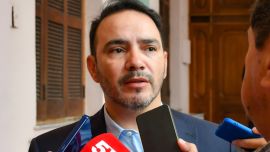Over 25,000 government representatives, campaigners and members of the media will gather in Glasgow from October 31 to November 14 for the UN COP26 climate summit, with hopes of increasing ambition on climate action in line with the Paris Agreement.
As the host country, the United Kingdom holds the presidency of COP26 and has appointed regional climate ambassadors to create further momentum ahead of the conference. Fiona Clouder, formerly UK ambassador to Chile, is the Regional Ambassador for Latin America and the Caribbean, and has been travelling across the region over the past year to meet with relevant stakeholders.
In an interview, Clouder discussed the main goals and challenges for COP26. While Latin America as a whole isn’t among the world’s biggest polluters, the ambassador told us how the region should embrace ambitious climate action, which could also bring numerous economic opportunities.
What are the UK’s main goals for COP26 as the host country?
It was very difficult that COP was postponed [in 2020], but we could reflect on the key priorities for the summit. We have four key objectives, starting with mitigation. The world has to come together to meet net-zero by the middle of the century. For that, we need every country to act together with ambition and urgency.
Then there’s the adaptation and resilience objective, as we want to shift the balance with finance towards that important area. Climate change is hitting the most vulnerable communities the hardest – many of them in Latin America.
Finance is also very important, and that’s our third objective. The industrialised world made a commitment [in 2009] to mobilise US$100 billion per year in finance for climate by 2020. We are now in 2021 and we are not at that level of commitment. There’s a big push to reach that target, working with multilateral development banks for them to align their portfolios, as well as with their private sector.
Finally, the last objective is around international collaboration. No country can do this alone. Whatever the different political and economic perspectives, we all need to do something and work together in a spirit of collaboration.
You mention the need for further climate funding and the need to redirect this to adaptation. We saw some progress at the UN General Assembly, with the US announcement to double climate funding. Can COP create momentum to reach the US$100 billion target soon?
We hope COP will push this forward. The announcement by [US President Joe] Biden is very welcomed and shows the leadership we need from other countries too. It’s not just about rich countries giving to the developing world – it makes economic sense for everybody. In the Caribbean, natural disasters such as hurricanes can take out a percentage of annual GDP. By the time money has been found and made available to reinvest in what was destroyed, another natural disaster happens and that country can never move forward. That’s not good for anyone. Making this investment now, by the countries most able to do so, helps address climate change and economics.
You’ve travelled quite extensively across the region this year and met with government officials. Is the region giving enough importance to the climate crisis?
I’ve travelled in Central America, then Ecuador and finally in the Southern Cone. Different governments with different perspectives. The region is firstly trying to deal with the pandemic, both the health and the social and economic impacts. What the region needs is hope. COP26 helps with that. We have to be realistic about the challenges of climate change, but there are also big opportunities that can create new jobs and economic growth, and raise the profile of the region. Taking action to address climate change can help everybody, whether it’s a fisher or a businessman developing new products.
Latin America isn’t a big polluter compared to other parts of the world, but it is one of the regions most affected by the impacts of climate change. What should be its role amid the climate crisis?
This region contributed a low portion of the emissions but that doesn’t mean it can ignore its own emissions. Every little helps. Everything that governments do, such as shifting to renewable energy, helps with the emissions targets. This is one of the most vulnerable regions, with governments that say they didn’t create the problem. But we have to move on from that statement. This is about understanding that Latin America is affected by climate change, but it’s also a place with lots of investment opportunities and prospects of growth. Raising the profile of the region, of its vulnerability and of its precious assets is very important.
There was a big call for a green recovery amid the pandemic, but the region has largely been following a business-as-usual model, with investment continuing in fossil fuels. How can governments change this path?
Much more can be done. The pandemic is a tragedy – it’s a moment in time that we have all suffered from. But climate change is an ongoing issue, not just a moment in time like the pandemic. It’s going to dominate our lives in the future. Focusing now on the actions that can be taken to help with that can provide a huge economic boost. It’s not just a policy for this year. There’s an agreement in Latin America on the problems brought by climate change. This now has to be turned into action. It’s not easy, Latin America needs finance and also skills and capacity building.
The economies of Latin America depend heavily on the region’s natural capital, which is currently highly endangered. How can the region take better care of its biodiversity and at the same time reach a green recovery?
We have worked in the region in the FACT Dialogue, which is forestry, agriculture and commodity trading. This is part of the nature campaign at COP, but we also hope it will lead to long-term work. It’s not about a definite policy but more about exchanging ideas and information. A lot of forest land in the region has been converted for agriculture, which is extremely important for the economic cycle of many countries. We have been discussing this in terms of traceability and bigger policy measures. It started off a conversation that we hope to build on. It helps raise the profile of the region to build new partnerships and initiatives.
Latin America has big potential regarding renewable energy, but fossil fuels are still very relevant for many countries. How can the energy transition be scaled up?
It’s in countries’ own interest to reduce their reliance on fossil fuels and make more use of renewables. There’s a big policy debate there. For example, when I was in Argentina, I asked why there weren’t more electric cars on the road and it was explained that this is because of tax barriers. Perhaps there are ways to allow that sector to grow.
The world is still far from meeting the Paris Agreement targets, with climate pledges not ambitious enough, including in Latin America. Can COP create momentum for more ambitious commitments?
We certainly hope that’s the case. We are pushing all the countries to revise their NDCs with more ambition and COP will build on that. It’s not enough to just publish the NDC, it’s also about developing the long-term strategy and converting that into real-world action. The recent leaders’ high-level event by Argentina was an important and helpful initiative.
* This article is reproduced with kind permission from Diálogo Chino.





















Comments